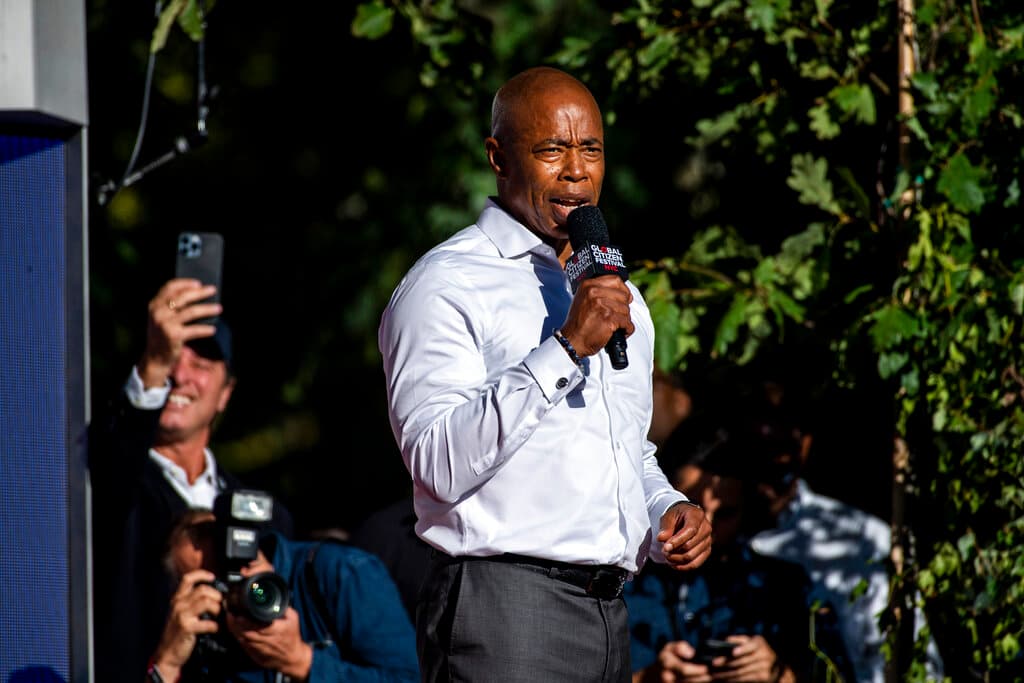Mayor Adams in the Doom Loop
Amid talk of an ‘office real estate apocalypse,’ Hizzoner is cowed by leftists in his own party and is failing to develop a pro-growth strategy out of New York’s crisis.

New York City is headed for fiscal disaster, according to a growing number of warnings. An “office real estate apocalypse” is the phrase being used by the National Bureau of Economic Research. The “value destruction” of city office space runs to $50 billion, it says. The Times says Gotham is “teetering on the brink” of a “budget crisis,” eyeing a $10 billion deficit and warning of the unthinkable — budget cuts — unless Mayor Adams raises taxes.
The research bureau foresees the plunging values sparking a “fiscal doom loop,” as our Russell Payne has reported. They note that 53 percent of the city budget is paid for by real estate taxes. The “fiscal hole” that they anticipate “would need to be plugged by raising tax rates or cutting government spending.” The economists concede either of these options “would affect the attractiveness of the city as a place of residence and work.”
Yet the Times, among others, is beating the drums against any idea of trimming New York’s bloated municipal budget, as Mayor Adams proposes. “Arrayed before the mayor,” the Times imagines, “is a cast of increasingly hostile counterparties who look askance at austerity and question the timing of his cost-cutting effort.” It’s the usual suspects who have driven New York to the edge of bankruptcy in the past and could do it again.
This motley crew of big spending Democrats includes “labor leaders eager to settle new, more generous contracts,” the Times says, along with a Democratically-controlled “City Council that is aggressively reconsidering” its prior assent to a few trims in the school budget. The Times warns that “support for the mayor’s November budget cuts is far from assured.” The New School’s James Parrott warns of harm to city employee’s “morale.”
No kidding. Mr. Parrott is distraught by the idea that Mayor Adams might be “using the economic downturn” as a pretext “to propose a really conservative budgeting approach.” After all, the Times says, it’s “unrealistic” to “demand cuts while expecting agencies to avoid service reductions.” This observation is true only if one ignores, as the Times does, the idea that more productivity could be gained for the city’s public workforce.
The Times notes a catalog of horrors that would follow spending cuts: “fewer garbage pickups,” or — we shudder to write — “fewer protected bike lanes.” The Gray Lady even warns of “fewer police officers on the streets,” though many of the Times’ readers would see that as a welcome vindication of “Defund the Police.” As for the Times itself, the only logical solution it likes is the reflex of urban liberalism: raise taxes.
After all, the Times observes, when faced with “multibillion-dollar deficits after the post-Sept. 11 economic nosedive,” and the “Great Recession” that followed the financial crisis of 2008, the city turned to the expedient of “raising property taxes.” The Times helpfully notes that these are the only levies “the city can raise on its own without state legislative approval.” Mayor Adams was noncommittal when the Times queried him on the idea.
As for the Sun, we wouldn’t support one centime of new taxation. We remember Mr. Bloomberg making that pledge. He lasted about a month, the Albany-based Empire Center reports, when he proceeded to cough up a cigarette tax hike. Mr. Bloomberg went on to launch a whopping property tax increase that City Council Democrats said would be “temporary.” That tax rise has yet to expire.
Higher taxes for a lower quality of life and public services — including failing schools — is fueling a catastrophic exodus of wealth from New York. We’ve heard estimates as high as half a trillion dollars in personal net worth that has left New York in the past two years — just by wealthy individuals moving to Florida. This is part of any “doom loop” that will push New York into a 1970s-era fiscal disaster.
The pressure is now on Mr. Adams to hold the line on spending — and taxes — or risk losing even more residents to fiscally saner climes. He talked a good game in his campaign and in his early weeks in office, including in an interview with the Sun. Since then we perceive no serious plan of supply-side tax cuts and deregulation. Or even a concerted campaign to talk to Albany about crime. His track record to date has been disappointing and he’s caught in the doom loop.

